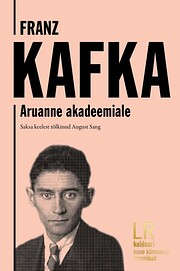

Cliquer sur une vignette pour aller sur Google Books.
|
Chargement... Aruanne akadeemialepar Franz Kafka
Aucun Actuellement, il n'y a pas de discussions au sujet de ce livre. aucune critique | ajouter une critique
Aucune description trouvée dans une bibliothèque |
Discussion en coursAucun
 Google Books — Chargement... Google Books — Chargement...ÉvaluationMoyenne: (5) (5)
|
|||||||||||||||||||||||||||||||||||||||||||||||||||||||||||||||||||||||||||||||||||||||||||||||||||||||
Review of the Loomingu Raamatukogu reprint (2022) of the original Estonian language edition Aruanne akadeemiale (1962) translation of selections from the German language original Die Erzählungen (German: The Stories) (1961) by August Sang
This is a reprint of the first ever Estonian language edition of Kafka's works which were presumably a selection made by the translator August Sang from a then recent German language edition of the Complete Stories. It contains the novella Metamorphosis, 2 short stories, the title work and The Hunger Artist and 9 very short vignettes which range from a single paragraph to 1 & 1/2 pages.
This was an effective collection of sometimes-nightmarelike, paranoic and often despairing scenarios, each of which was memorable in their own way. The reader can make their own interpretations from the allegorical nature of the writing.
The contents are listed below with links to the English language Wikipedia entries for each story (some of which are so short that a complete translation is provided) from which I noted the dates of first publication or presumed dates of composition.
1. "Metamorfoos"/Metamorphosis (1915) A man turns into a giant insect overnight and although his family is repulsed by him they allow him to continue to live in his bedroom until the situation becomes untenable.
2. "Aruanne akadeemiale"/A Report to an Academy (1917) An ape who has educated himself to act as a human reports on the experience to a science academy.
3. "Näljakunstnik"/A Hunger Artist ( 1922) A performance artist travels a circuit performing 40-day hunger strikes in front of public audiences.
4. "Seaduse ees"/Before the Law (1915) An anecdote about standing at the door of justice and not being able to gain entry. Later used in Kafka's novel The Trial
5. "Tsirkuserõdul"/Up in the Gallery (1919) A spectator observes a circus artist performing with her horse under the supervision of a ringmaster.
6. "Uus advokaat"/The New Advocate (1914-1917) A new lawyer is introduced to a firm. From his name Bucephalus, the implication is that the current lawyering profession has fallen far from the nobility of Alexander the Great's horse.
7. "Keisri sõnum"/A Message from the Emperor (1931) A dying emperor whispers his last words to a lackey who is unable to find his way out of the endless palace in order to deliver the message to anyone. This anecdote was incorporated into a short story The Great Wall of China.
8. "Sireenide vaikimine"/The Silence of the Sirens (1931) Kafka retells the story of Ulysses from Homer's Odyssey where he sealed his ears with wax in order to not be tempted by the songs of the sirens.
9. "Väike valm"/A Little Fable (1931) A mouse is trapped in a narrow passageway by a cat.
10. "Teeleminek"/A Departure (1936) A lord saddles his horse for a long journey only saying that its purpose is to get away from where he currently is.
11. "Poseidon"/Poseidon (1920) The god Poseidon laments his situation and how he is misunderstood.
12. "Tüürimees"/The Helmsman (1936) A helmsman is forced to give up his position in a boat.
The "Our Kafkaing" Afterword by several prominent Estonian poets and writers is mostly a record of their own first experiences with reading Kafka and about his adaptations on stage and film. It rarely comments on the actual stories contained in the volume itself.
I read Aruanne akadeemiale in my heritage language of Estonian in order to keep up my additional language skills.
This 2022 Estonian edition of Kafka is part of the Estonian Loomingu Raamatukogu's Kuldsari (Gold Series) which is making out of print releases newly available. The new editions expand on the earlier content in most cases. The Gold series consists of 6 releases annually. (